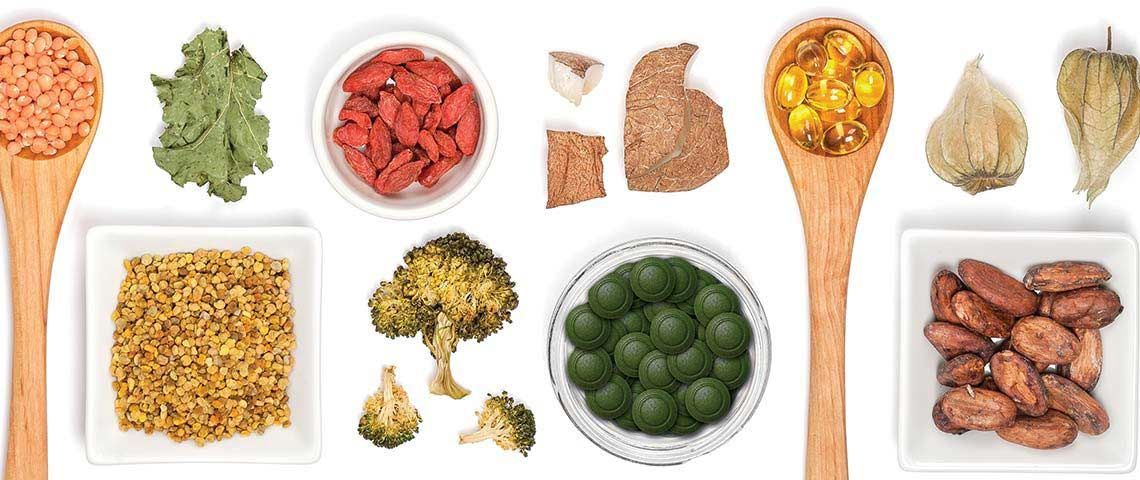Estimated reading time: 4 minutes
April 8, 2019
You may have heard of this plant and its wide range of health benefits, but chlorella surpasses the ‘green supplements’ trend, by supporting intestinal health.
Often tagged as a ‘superfood’, chlorella has a high nutrient density, with healthy aging properties, as well as energy-boosting elements. This blue green, freshwater algae, taken as a supplement, also contains essential nutrients such as vitamin B12, iron, and zinc, which helps support your digestive system function, as well as help support vegans and vegetarians with these nutrients in their diet. Chlorella stimulates oxygen flow, which also promotes optimum organ function, supports the immune system and reduces symptoms of fatigue.
The vast number of documented chlorella benefits are clearly impressive, but most impressive is the potent components this supplement has on helping support intestinal health.
Recent studies have observed the effects of chlorella on various digestive system functions, with significant results, which leads to promising new options for those looking for intestinal health support.
Chlorella's Unique Nutrition
There are a plethora of green powders and supplements available in the 21st century, all promising a wide range of benefits, such as spirulina, wheatgrass and barley grass. However, many of these have not been scientifically proven to help support intestinal health, and in fact, may be harmful to a sensitive digestive system. For example, spirulina blocks the absorption of vitamin B12 in the body1, while chlorella has been proven to alleviate vitamin B12 deficiency in patients2. This confirms that chlorella would be the best plant source, non synthetic vitamin B12 supplement available to vegans and vegetarians, as well as those who have a vitamin B12 deficiency and or who need support with their digestive system function.
Chlorella is also one of the richest sources of chlorophyll and contains as a unique compound known as Chlorella Growth Factor (CGF). The immune system is stimulated by CGF, which supports the body at a cellular level. This is remarkable news for your digestive system function because most of your immune system in located in your gut!
The Health Benefits of Chlorella
The human body can retreat into a state of dysbiosis due to several reasons, and over time, if this imbalance isn’t addressed, can lead to poor health conditions. Toxins found in many foods (heavy metals, pesticides, carcinogens) and in the environment, can build up in cells and tissues, often making health conditions worse. Current research continues to suggest that chlorella assists with the body’s natural purification process, which helps support overall health and well-being.
How to Take Chlorella to Support Gut Health
All chlorella supplements should be processed because the plant has a thick cell wall which is difficult for the digestive system to break down. The best way to access all the nutrients and therefore health benefits contained within chlorella is to buy chlorella in which the cell wall of the chlorella has been pulverized. Whether in tablet or powder, a pulverized cell wall chlorella provides the highest digestibility and nutrient absorption rate of any kind of chlorella. Sun Chlorella pioneered the chlorella cell wall pulverization method and offers the highest digestibility and nutrient absorption rate of any kind of chlorella since 1969.
When starting off with chlorella, begin with half a teaspoon (1.5g), then build up to a full teaspoon (3g) after 1-2 weeks. You can then increase to 6-9g per day, which will provide optimum beneficial effects. Make sure to drink at least 1-2 litres of water daily and remember- consistency is key with any natural health food.
With an abundance of vitamins, minerals, phytonutrients and more, it is clear that taking chlorella, along with a healthy diet, will help support those who are in drastic need of nourishment, and chlorella needs to be taken more seriously as a supportive supplement for intestinal health.
2 Nutritional Supplementation with chlorella pyrenoidosa Lowers Serum Methylmalonic Acid in Vegans and Vegetarians with a Suspected Vitamin B12 Deficiency

Chlorella: Promotes Healthy Digestive Function